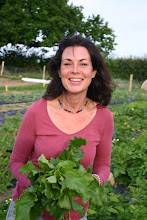Don’t for one minute think that living on a smallholding is like a Good Housekeeping gingham and roses article with a delicious homemade Victoria sponge always on the table. It’s not. It’s the aim, but the reality is that there is always something needing tending, mending, cleaning, picking and processing from dawn to dusk, 365 days a year.
We took a little holiday to Crete this year. We left the vegetables peacefully growing in the field, the tomatoes ripening in the greenhouse, the plums swelling in the orchard. It was the beginning of August.
Crete was beautiful, arid and hot. Only the hardiest plants showed any signs of life – silver leafed olive trees clinging to the red rocky mountain slopes, cacti, fragrant wild sage and splashes of magenta bougainvillea against white-washed walls. Nothing seemed to be actually growing, just waiting. The cicadas, hidden from sight, scritched loudly day and night, the Meltemi wind bowled down the mountains bending the eucalyptus and olive trees under its invisible wave. We lay in the sun reading books, we swam, we drank cold beer in cafes. It was delightful. I thought, ‘Could I live like this?’
When we landed back in England the sun was shining and the greenness was startling. We drove at 6am past grazing sheep and cattle, gardens garish with summer blooms in their prime. We wheeled our suitcases up the lavender lined path to the front door and thought it might be a nice idea to have a little snooze after 24 hours without sleep. But then we thought we might just take a peep at the field and the greenhouse first with a cup of English tea in hand.
We had been warned about the blight while we were away by friends who had come for a little family holiday in the country and had ended up tirelessly digging up and burning all our tomato plants (as well as coping with a spot of cat terrorism!). The warm damp weather had been perfect for the blight and it had taken out all our carefully nurtured tomatoes and potatoes.
In the field there was a riot. I wondered whether to sit down with my cup of tea and look at a thistle for five minutes to see if I could actually watch it growing. Forget time-release photography. The weeds swayed in the light morning breeze, robust and triumphant. Every species of weed under the sun seemed to have moved into our little plot. Where had they all come from? All around is pure pasture that wouldn’t even accept my gift of lovely wild flower seeds in the spring and yet on our veg plot the variety was astounding and they had taken over every inch of ground completely hiding my carefully sown rows of spring onions, carrots and beetroot.
Of course, we started to pull out the odd weed, tea in hand, and one weed leads to the next and finally after about an hour of toiling we found a carrot top. So they were there, bless them…my babies! Meanwhile, just behind me, I was sure I could hear a faint creaking and rushing of sap as the weeds gathered pace - growing, growing - faster than I could pull their brethren out.
The Weeds fall into my tending category – an on-going job, but I’m delighted to say that my baby vegetables are soldiering bravely on with their growth and now stand like rows of well behaved children in orderly lines ignoring the mayhem around them.


The jam jars and kilner jars are stacking up colourfully on every surface. We have eaten jam with everything…jam on lamb – not bad! But jam is sticky stuff and a lot of washing up needs to be done, which is fine if you have a tap. But there lies a problem: somehow our kitchen tap came off in my hand the other day. Water sprayed everywhere, soaking me and entertaining the children. I rammed it back into the hole where it remains wonkily emitting just the faintest trickle when full on. So now I have to boil pans and kettles for the washing up, which, as you can imagine, just adds to the fun.
